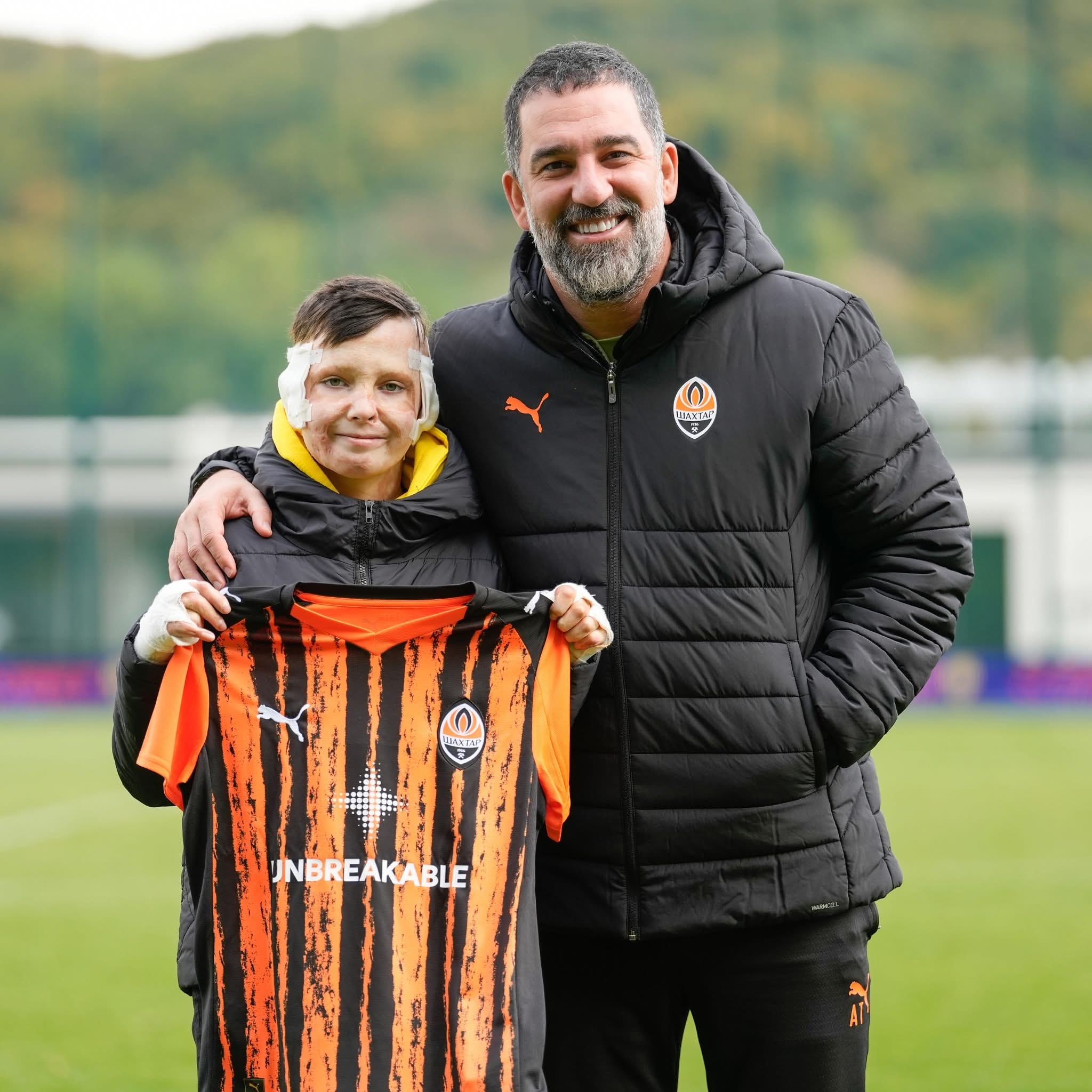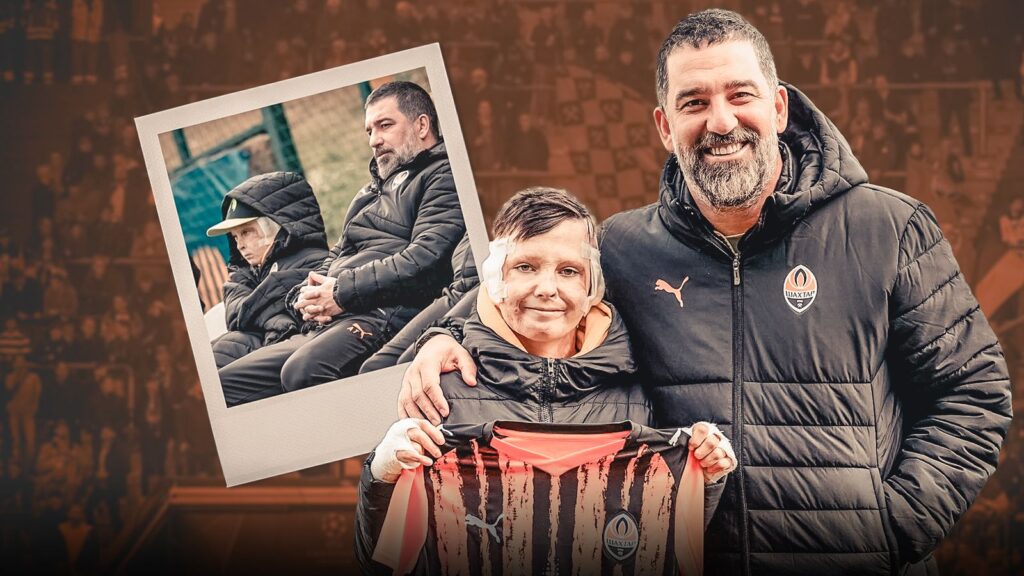Shakhtar Donetsk have lost once in the Ukrainian Premier League this season. It was a 4-1 defeat to LNZ Cherkasy, a nominal home game for Shakhtar in Lviv. There were mitigating circumstances. They spent much of the previous night in a bomb shelter.
Such is the lot of a team trying to serve as a symbol of hope and endurance for supporters in the Donbass region of Ukraine amid the ongoing war. Arda Turan, the former Barcelona midfielder, is the man tasked with European football’s toughest job.
“In life, I have never been a person who hides behind excuses but there have been situations we could not foresee,” Turan tells Sky Sports. That is an understatement. Shakhtar had only just returned from a long away trip to Aberdeen when it happened.
“The bombs came the night before the next game. We went down to the shelter. It might seem strange but we were not afraid, just worried for our loved ones. We had no sleep that night. We never really know the circumstances in which we will play the game.”
Inspiration came in the aftermath of defeat. “I was sad because it was a critical game for us. And this boy, Roman, a big Shakhtar supporter, who had 35 surgeries because of his injuries when his house was bombed, came to visit us inside the dressing room.”
Turan reveals: “He said to me, ‘Mister, don’t be sad. There are good days and bad days in life. You have to keep going.’ This was a life lesson from an eight-year old boy who has been operated on 35 times.” Even now, Turan is understandably emotional about it all.
“Yes, football is important. And we have to respect the job and give it 100 per cent for the people who follow us. But, on the other hand, it is entertainment, it is not as real as life. We have to understand the difference. It was Roman who gave me that life lesson.”

Turan is an impressive character. At 38, he is one of the brightest young coaches in Europe having guided Eyupspor to promotion followed by a top-six finish in his native Turkey. He had options for his next move. So, why did he choose Shakhtar Donetsk?
“You need to get out of your comfort zone to be successful,” he explains. “Yes, this is a big challenge with very young players. But it is the chance to develop a team, to learn and compete at the same time. I want this responsibility. I believe I can learn a lot here.”
Six months in charge of Shakhtar has already thrown up more than a coach might expect to encounter in years elsewhere. Putting aside the emotions, the practicalities of it all are demanding. Unable to play in their own city, this is a life spent on the road.
“At a regular club, you can go back to your house a few hours after a trip. Here, it is not like that. Sometimes it takes more than a day and you can only start working again after 48 hours.” Not easy when Shakhtar are in Europe, effectively playing every game away.
Their early European home qualifiers were played in Slovenia before switching to Poland for their group games in the Conference League. Lviv hosts their domestic home fixtures. Turan’s challenge is to turn logistical difficulties and adversity into motivation.
“We are trying to use it. When you are in the middle of a war and people are making such a big sacrifice, you should definitely touch on these things. Why are they here playing football? Why leave their families in the middle of a war? It has to make sense.
“I think we have made it into a positive and tried to have a lot of fun too and try to be cheerful all the time. We have a lot of young Brazilian players who are trying to adapt and manage that psychological side but there are times when it is exhausting.
“We have a lot of teenagers who need more rest than the experienced players so we are often forced to change the team. Unfortunately, you just cannot play the same team three days later with the amount of travel that we have. It is like inviting an injury.”
From the outside, it might not be such a surprise that Shakhtar are top of the table under Turan given that they been champions of Ukraine on 15 occasions since the turn of the century. But that UEFA Cup win in 2009 was a different era to this one, in truth.
“The team I have is a very different team from the previous Shakhtar teams,” says Turan. Having finished third last season, they have since lost star players Kevin and Heorhii Sudakov to Fulham and Benfica, respectively. Other key men are now out injured.
“We lost some players but the squad is now full of young footballers who are open to improvement. That was the club strategy. I agreed to it and I respect. Rather than buying players who are complete, we want to go with players who have great potential.
“Isaque is 18, Kaua [Elias] is 19, Lucas Ferreira is 19, [Luca] Meirelles is 18. Sometimes they will play badly because they are only young but we are not taking away their right to make mistakes. And, when you win, the happiness of that feels completely different.”
Kaua scored in Shakhtar’s latest European win, a game sandwiched between victories over reigning champions Dynamo Kyiv and a 7-1 triumph over SK Poltava last time out. “The young players are a source of pride. They are turning me into a braver coach.”
Having said that, Turan talks of having to adapt his tactics to acknowledge their unusual situation. “Sometimes we cannot push. This is a team that played with 40,000 or 50,000 fans and is now playing in front of 2,000 spectators. Motivation is a challenge.”
But he is finding new ways, coaching the team in English and in Spanish. For this interview, he reverts to Turkish when the conversation turns in a certain direction. “I prefer to use my native language when discussing more sensitive matters,” he explains.
And with that, his thoughts return to young Roman and a responsibility that weighs heavily on his shoulders. He wants Shakhtar Donetsk to be champions of Ukraine again. “I really want to win the title for him,” he says. “It is like a dream now for me to do it.”





